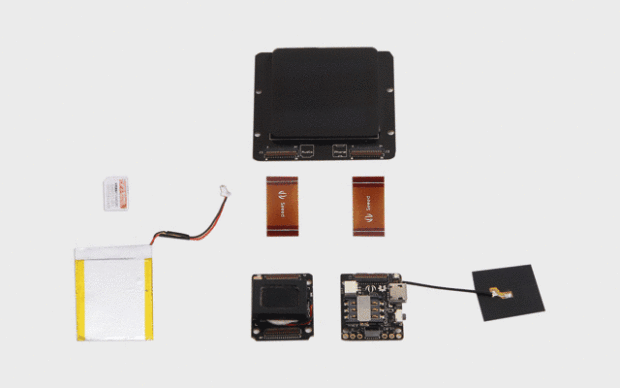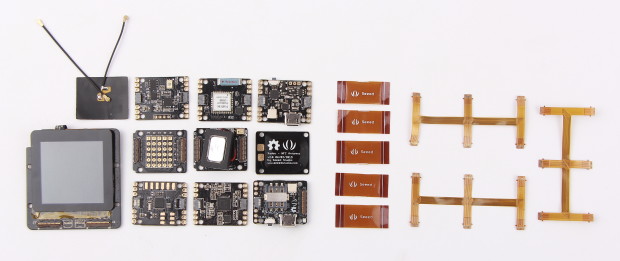
Today SeeedStudio launched an intriguing new Kickstarter project, the RePhone. Reminiscent of Project Ara, Google’s much hyped but continually delayed effort to build a “hardware ecosystem” around smart phones, the RePhone is a modular phone built from open source components.
The core of the phone is provided by the RePhone Core GSM + BLE module, or by the RePhone Core 3G module, which provides a faster data connection but lacks BLE support. However, beyond these two core modules offering the cell connection are 8 more add-on modules from Seeed’s Xadow range — a 1.54-inch touch screen, a 5×7 LED board, an NFC board, a GPS board, an audio board, a basic sensor board, a GSM breakout board and an Arduino-compatible microcontroller.
The modules can be connected together in a number of different ways, using FPC ribbon cable, soldered wires, conductive thread, or even just breadboarded.
However the RePhone is about more than just the hardware, Seeed has developed library support not just for the Arduino, but also for Lua and Javascript, as well as a full SDK based around Eclipse for C/C++ developers, and IFTTT support.
Seeed hasn’t just left us with a pile of boards; they’ve also gone a step further and produced the RePhone Create Kit, allowing you to use paper craft to build and customise cases for the RePhone modules in a variety of styles and shapes.
Interestingly the RePhone modules are being billed as not just Arduino-compatible, but also as being compatible with the Pebble Time. We met Seeed’s prototype Pebble smart strap earlier in the year at Maker Faire Bay Area and I speculated at the time that the smart strap could turn out to be a powerful lever to drive adoption of wearables.
It’s therefore interesting to see Seeed’s explicit support for the Pebble, with a Strap Kit being offered as one of the backer packages, and support for the Pebble platform given equal billing to Arduino support.
The modular nature, small size, and open source nature of the RePhone, even more so than Google’s Project Ara if it ever arrives into the market, offers the potential to drastically shorten the time to market for wearable and Internet of Things products.
Seeed obviously is aware of this and alongside the RePhone kits aimed at Makers is the RePhone Hardware Development Kit. With circuit designs using their Open Parts Library the kit should help Makers turn their prototypes into real products. When this gets into Maker hands I’m expecting to see a number of Kickstarter projects spring up with the new RePhone boards at their core.
Before the arrival of the iPhone, cellphones came in a bewildering number of sizes, shapes, and form factors. After the iPhone they all look like the same black rectangles. With their Project Ara Google obviously thought that this was due for a change. It’s not just about the potential for wearables or the Internet of Things, it’s going to be interesting to see if Seeed can beat Google to the punch with the RePhone and introduce diversity into the cellphone market again.
The RePhone Kickstarter project launched today, while the RePhone is expected to ship to early bird backers in February next year.
If you’re interested in learning more about the project, the RePhone will be on display at the Seeed booth at Maker Faire NY this weekend. We’ll be taking a close look at it then, so look out for more coverage soon.
ADVERTISEMENT














